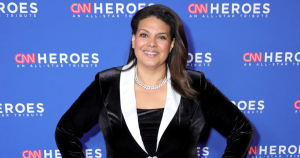As you grow older, having your period is just another fact of life. Another month, another period. Another week of cramps, another week of chocolate cravings, another week of quietly going about your business while your uterus lining sheds.
But suddenly, something is off. A change in your flow, more intense cramps than usual, a missed month — whatever it is, a change in your typical cycle can set off some alarm bells.
Videos by PopCulture.com
Noticing changes in your period isn’t always something to worry about — in fact, your period won’t always stay the same forever. Alyssa Dweck, M.D., a practicing OB/GYN and assistant clinical professor of obstetrics and gynecology at Mount Sinai School of Medicine, told Redbook that as you grow older, your period will change with you.
“There’s an unspoken rule among doctors that a woman’s period tends to change through the decades,” she says. “Your cycle is often an indicator of what’s going on in your health and in your life, and there are many transitions between your twenties, thirties, and forties.”
Continue ahead to learn what kind of differences to expect as you age, and what to do about them.
Your period in your 20s
Chances are, during your 20s you’re transitioning from eating mass amounts of takeout on the reg to making an effort to include the occasional vegetable in your meals every now and then. Just as you grow more mature and health conscious, your period grows with you. Sometimes it can depict changes in your health; other times, not so much.
If you’ve recently changed your form of birth control, like switching to an IUD, your period can become lighter or even nonexistant — nothing to worry about.
But with your 20s also comes your first big job, first big relationship, first big financial decision, etc., all adding up to a whole lot of stress. Stress can most definitely affect your period, making it irregular and erratic.
If you’re not super stressed and still noticing an irregular period (like it drags on forever, it’s unpredictable, or you’ve even developed excess facial hair or acne) it could be that you have polycystic ovarian syndrome (PCOS), a hormonal imbalance that causes what looks like a string of small cysts to grow on your ovaries. Dweck says that it shows up for many women in their 20s.
Your period in your 30s
Many benign health conditions related to your period can pop up in your 30s: fibroids, polyps and benign uterine growths can all be treated, but first will mess with your period, making it heavier and painful.
Another milestone many women encounter in the 30s is a big one: having kids. It could take a while for your period to get back to normal after delivering a baby, especially if you’re breastfeeding. Even if you haven’t had kids yet but you’re trying (and it’s not happening right away), the stress could irregulate your period as well. The same goes if you’ve had a miscarriage.
Your period in your 40s
Although you may be years away from experiencing menopause, you may notice some changes like a longer or even a missed period every now and then in your 40s. You can thank perimenopause for that, or the time in which your body is prepping for menopause.
“Perimenopause-type changes can start up to 10 years before actually starting menopause,” Dweck says.
Once your body is approaching menopause, the regular waxing and waning levels of estrogen and progesterone get thrown off their game and trigger changes in your cycle.
If you’ve made some big changes to your fitness routine in your 40s and are way more active now than ever, your period might go MIA altogether.
If your periods are being super heavy or abnormal, it could be the sign of something serious. “Uterine cancer is something that can come up,” Dweck says. “Keep in mind, this is an extreme rarity, however, it’s not uncommon to find a pre-cancerous cell that could be causing a problem with your periods around this time in your life.”
Your period in your 50s and beyond
Scientifically speaking, if you haven’t had a period for over a year, you’re officially in menopause. Congratulations, no more periods! But if you do notice bleeding during menopause, it’s definitely time to call a doctor and get it checked out.





